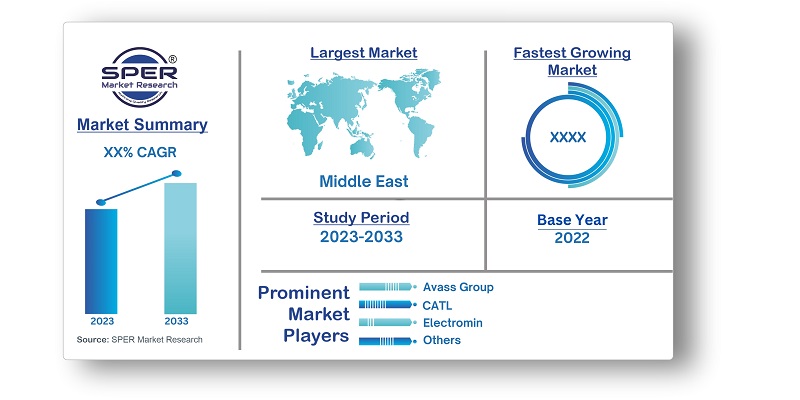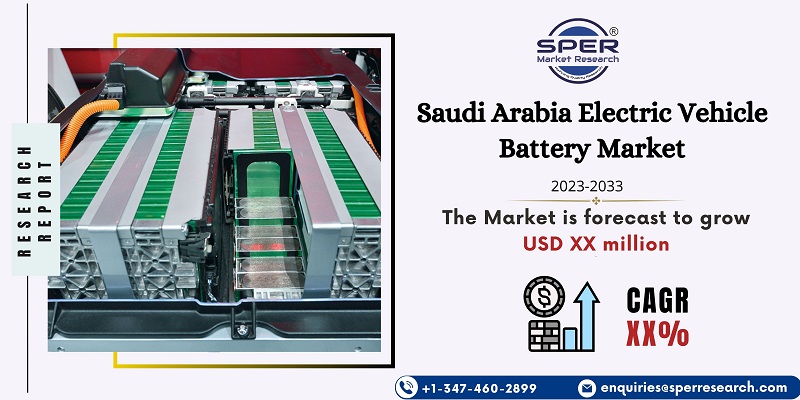
Saudi Arabia EV Battery Market Growth, Size, Trends, Share, Revenue, Demand and Future Outlook
Saudi Arabia Electric Vehicle Battery Market Size- By Battery type, By Vehicle type, By Propulsion type- Regional Outlook, Competitive Strategies and Segment Forecast to 2033
| Published: Dec-2023 | Report ID: AMIN23209 | Pages: 1 - 107 | Formats*: |
| Category : Automotive & Transportation | |||
- The Australian company Avass Group recently revealed that it has signed an agreement with Saudi Arabia to jointly produce electric vehicles and lithium batteries. The agreement bolsters Avass Group's plans to manufacture large-scale lithium batteries and fully electric buses in Saudi Arabia.
- The alliance arose from consideration of the strategic advantage Saudi Arabia possesses due to its central location between Asia and Europe. Given the current development patterns of the electric vehicle sector and the growing consumer awareness of environmental protection, Avass Group is targeting a significant portion of the global electric vehicle market.


| Report Metric | Details |
| Market size available for years | 2019-2033 |
| Base year considered | 2022 |
| Forecast period | 2023-2033 |
| Segments covered | By Battery type, By Vehicle type, By Propulsion type |
| Regions covered | Eastern Region, Western Region, Southern Region, Northern Region |
| Companies Covered | Avass Group, CATL, Electromin, EV Metals, General Motors, Johnson Matthey, POSCO Chemical, Stellantis, Others |
- Automobile Manufacturers
- Battery Manufacturers
- Charging Infrastructure Providers
- Government and Policymakers
- Investors and Financiers
- Research and Development Organizations
- Utilities and Energy Companies
| By Battery type: |
|
| By Vehicle type: |
|
| By Propulsion type: |
|
- Saudi Arabia Electric Vehicle Battery Market Size (FY’2023-FY’2033)
- Overview of Saudi Arabia Electric Vehicle Battery Market
- Segmentation of Saudi Arabia Electric Vehicle Battery Market By Battery type (Lead Acid Battery, Lithium Ion Battery, Nickel Hydride Market)
- Segmentation of Saudi Arabia Electric Vehicle Battery Market By Vehicle type (Commercial Vehicle, Passenger Vehicle)
- Segmentation of Saudi Arabia Electric Vehicle Battery Market By Propulsion type (Battery Electric Vehicle, Plug-in Hybrid Vehicle, Fuel Cell Electric Vehicle)
- Statistical Snap of Saudi Arabia Electric Vehicle Battery Market
- Expansion Analysis of Saudi Arabia Electric Vehicle Battery Market
- Problems and Obstacles in Saudi Arabia Electric Vehicle Battery Market
- Competitive Landscape in the Saudi Arabia Electric Vehicle Battery Market
- Impact of COVID-19 and Demonetization on Saudi Arabia Electric Vehicle Battery Market
- Details on Current Investment in Saudi Arabia Electric Vehicle Battery Market
- Competitive Analysis of Saudi Arabia Electric Vehicle Battery Market
- Prominent Players in the Saudi Arabia Electric Vehicle Battery Market
- SWOT Analysis of Saudi Arabia Electric Vehicle Battery Market
- Saudi Arabia Electric Vehicle Battery Market Future Outlook and Projections (FY’2023-FY’2033)
- Recommendations from Analyst
1.1. Scope of the report1.2. Market segment analysis
2.1. Research data source2.1.1. Secondary Data2.1.2. Primary Data2.1.3. SPER’s internal database2.1.4. Premium insight from KOL’s2.2. Market size estimation2.2.1. Top-down and Bottom-up approach
2.3. Data triangulation
4.1. Driver, Restraint, Opportunity and Challenges analysis4.1.1. Drivers4.1.2. Restraints4.1.3. Opportunities4.1.4. Challenges4.2. COVID-19 Impacts of the Saudi Arabia Electric Vehicle Battery Market
5.1. SWOT Analysis5.1.1. Strengths5.1.2. Weaknesses5.1.3. Opportunities5.1.4. Threats5.2. PESTEL Analysis5.2.1. Political Landscape5.2.2. Economic Landscape5.2.3. Social Landscape5.2.4. Technological Landscape5.2.5. Environmental Landscape5.2.6. Legal Landscape5.3. PORTER’s Five Forces5.3.1. Bargaining power of suppliers5.3.2. Bargaining power of buyers5.3.3. Threat of Substitute5.3.4. Threat of new entrant5.3.5. Competitive rivalry5.4. Heat Map Analysis
6.1. Saudi Arabia Electric Vehicle Battery Market Manufacturing Base Distribution, Sales Area, Product Type6.2. Mergers & Acquisitions, Partnerships, Product Launch, and Collaboration in Saudi Arabia Electric Vehicle Battery Market
7.1. Saudi Arabia Electric Vehicle Battery Market Value Share and Forecast, By Battery type, 2023-20337.2. Lead Acid Battery7.3. Lithium Ion Battery7.4. Nickel Metal Hydride Battery
8.1. Saudi Arabia Electric Vehicle Battery Market Value Share and Forecast, By Vehicle type, 2023-20338.2. Commercial Vehicle8.3. Passenger Vehicle
9.1. Saudi Arabia Electric Vehicle Battery Market Value Share and Forecast, By Propulsion type, 2023-20339.2. Battery Electric Vehicle9.3. Plug-in Hybrid Vehicle9.4. Fuel cell Electric Vehicle
10.1. Saudi Arabia Electric Vehicle Battery Market Size and Market Share
11.1. Saudi Arabia Electric Vehicle Battery Market Size and Market Share By Battery type (2019-2026)11.2. Saudi Arabia Electric Vehicle Battery Market Size and Market Share By Battery type (2027-2033)
12.1. Saudi Arabia Electric Vehicle Battery Market Size and Market Share By Propulsion type (2019-2026)12.2. Saudi Arabia Electric Vehicle Battery Market Size and Market Share By Propulsion type (2027-2033)
13.1. Saudi Arabia Electric Vehicle Battery Market Size and Market Share By Vehicle type (2019-2026)13.2. Saudi Arabia Electric Vehicle Battery Market Size and Market Share By Vehicle type (2027-2033)
14.1. Saudi Arabia Electric Vehicle Battery Market Size and Market Share By Region (2019-2026)14.2. Saudi Arabia Electric Vehicle Battery Market Size and Market Share By Region (2027-2033)14.3. Eastern Region14.4. Western Region14.5. Northern Region14.6. Southern Region
15.1. Avass Group15.1.1. Company details15.1.2. Financial outlook15.1.3. Product summary15.1.4. Recent developments15.2. CATL15.2.1. Company details15.2.2. Financial outlook15.2.3. Product summary15.2.4. Recent developments15.3. Electromin15.3.1. Company details15.3.2. Financial outlook15.3.3. Product summary15.3.4. Recent developments15.4. EV Metals15.4.1. Company details15.4.2. Financial outlook15.4.3. Product summary15.4.4. Recent developments15.5. General Motors15.5.1. Company details15.5.2. Financial outlook15.5.3. Product summary15.5.4. Recent developments15.6. Johnson Matthey15.6.1. Company details15.6.2. Financial outlook15.6.3. Product summary15.6.4. Recent developments15.7. POSCO Chemical15.7.1. Company details15.7.2. Financial outlook15.7.3. Product summary15.7.4. Recent developments15.8. Stellantis15.8.1. Company details15.8.2. Financial outlook15.8.3. Product summary15.8.4. Recent developments
15.9. Others
SPER Market Research’s methodology uses great emphasis on primary research to ensure that the market intelligence insights are up to date, reliable and accurate. Primary interviews are done with players involved in each phase of a supply chain to analyze the market forecasting. The secondary research method is used to help you fully understand how the future markets and the spending patterns look likes.
The report is based on in-depth qualitative and quantitative analysis of the Product Market. The quantitative analysis involves the application of various projection and sampling techniques. The qualitative analysis involves primary interviews, surveys, and vendor briefings. The data gathered as a result of these processes are validated through experts opinion. Our research methodology entails an ideal mixture of primary and secondary initiatives.



Frequently Asked Questions About This Report
PLACE AN ORDER
Year End Discount
Sample Report
Pre-Purchase Inquiry
NEED CUSTOMIZATION?
Request CustomizationCALL OR EMAIL US
100% Secure Payment






Related Reports
Our Global Clients
Our data-driven insights have influenced the strategy of 200+ reputed companies across the globe.




















